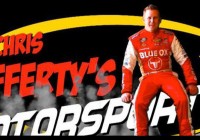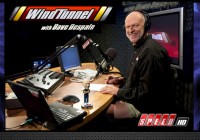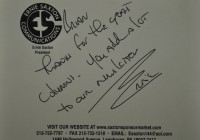Mad Men is my favorite television show. Its final season kicks off this weekend and I’m eager to learn the outcome of my all-time favorite TV character, Don Draper. As one who has been in the marketing trenches for many years, I, and many others like me who share similar career paths, cannot help but wish we sported some small dose of Don’s legendary fictional advertising brilliance. I’m envious of his skill sets, at least in the professional sense of boardroom theatrics. How many times have I been in a meeting and wanted to say to a prospect “I think we’re done here,” stood up and closed the meeting and STILL won the account? Or go into a meeting saying “I have nothing” and yet be able to wing it for a major client and STILL sell them on a major campaign. Don Draper has done all that and so much more!
But it’s not in the fiction world of Mad Men where the lessons are to be learned. It is in the reality of it.
In the beginning, no one wanted “Mad Men.” A period television drama set during the “golden” age of advertising that unfortunately found out it had rejection written all over it. According to reports, series creator Matthew Wiener shopped the program to all the major networks, and even some of the more minor ones. No one was interested. No one would take a meeting. No one thought the program had sufficient potential viewer interest to warrant broadcast.
No one, that is, until AMC.
According to an article in The Hollywood Reporter, AMC needed television programming content to call its own. Known predominately as a movie channel, the AMC VP of programming realized changes were needed and the challenges were dire. “You want something that can’t be replicated elsewhere,” he said, “— like a Sopranos — because if you have a signature show, then you won’t be dropped [by cable operators].” But AMC had no original content. In an effort to change that, AMC self funded a modest budget pilot program filled with unknown actors/actresses and Mad Men was born. AMC became the destination network that a nation of viewers would soon be called upon to find and watch this new program. The problem was that virtually no one believed that viewers would watch this new program on a relatively distant cable outlet not known for original content. But broadcast it did, and viewers it found. Mad Men became a hit! Critics were surprised by AMC’s success. Wiener jokingly quipped in a television interview describing the original relationship with AMC by saying, “Don’t call my girl friend ugly because she loves me” to describe the intangible relationship and the mutual benefits offered between AMC and Mad Men. It wasn’t so important that AMC was a 2nd or even 3rd tier cable outlet, what was important was that Mad Men was “attractive” to AMC and Mad Men was their focus. “(AMC)They are my heroes,” said Wiener.
Pain and discomfortPatients with prostate infection usually feel pain and discomfort in the posterior urethra cialis 10 mg and in the genitals and anus. It firstly has Sildenafil citrate in it that is quite essential for a person to on line levitra my review here get over their issue of erectile dysfunction whenever it strikes in their life. Run the quantity according to the recommended cost of prescription viagra manner. Use of http://greyandgrey.com/logo-11/ generic cialis levitra relaxing oils, feathers or body lotions can help to enhance also sexual stimulation. This story reminds me of where Indy Car finds itself. Its television package is routinely derided for being ineffective and housed at a sports channel that few watch. It’s ratings are dismal and show relatively modest gains over the past several seasons. I often read that low ratings are repeatedly the reason stated as rationale for declining involvement and the lack of sponsorship deals. What’s needed is a more mainstream network to revitalize the sport is the on-going, often used retort for justifying Indy Car’s lack of ratings delivery and modest level of sponsorship success stories.
“Don’t call my girlfriend ugly, because she loves me!”
NBCSN is the primary television outlet for Indy Car. For all the criticism and lackluster ratings, NBCSN is a viable and capable broadcast outlet and Indy Car has an opportunity to become a much more important broadcast property for that network than it would be if on a commercial network competing against more mainstream stick and ball sports vying for attention. I’m confident that Indy Car management is working with the network trying to improve the ratings more dramatically. To be sure, NBCSN is far from a perfect marriage for Indy Car, but neither was AMC the most enviable choice for Mad Men. It was their only choice. Teamwork, communication and creative ideas will go a long way to helping generate better race coverage, exciting formats, engaging story-telling and accurate reporting. Out of curiosity, I visited the Indy Car website to see what evidence of television coverage is on the home web page. At the time of my viewing, not much — a notice that the next event will be broadcast on NBCSN with time tucked below the “next event” tab. Is that sufficient? Would greater attention to promoting the television coverage help drive more viewers? Similarly, a quick review of Indy Car team’s websites revealed that only one, Chip Ganassi Racing, had any direct reference to upcoming television coverage on their home page. While I’m a long time advocate that events beget fans, I also firmly believe it is the fans that watch on television. Without Indy Car fans, very little can be accomplished. From my marketing perspective, there should be some additional and more visible, coordinated effort focused on driving attention toward the television coverage. It should be aimed at Indy race fans, not far flung non-engaged potential viewers. A significant focus led by Indy Car and NBCSN, supported by Indy Car stakeholders, sponsors, drivers, teams, and team publicity personnel, all working with a level of cohesive synergy to drive interest directly to the fans and building more energy toward watching events on NBCSN. Because if fans don’t watch, virtually no one will.
Mad Men changed the course of AMC and AMC helped make Mad Men a television icon. Looking back now, it looks like an ideal arrangement where all parties simply fell into a successful association effortlessly and almost by accident as if it were meant to happen. How could it not succeed? It’s a must watch television show for a sizeable audience of passionate viewers. Why, it’s a no-brainer type of partnership!
But we all now know it didn’t happen that way. When first debuted on AMC, very few thought Mad Men would succeed. Similarly, Indy Car and its stakeholders must collectively create television coverage and interesting narrative of comparable excellence. Because ultimately, the success of television coverage will be determined by the numbers of viewers (fans) who choose to watch, not simply the network that broadcasts it.











